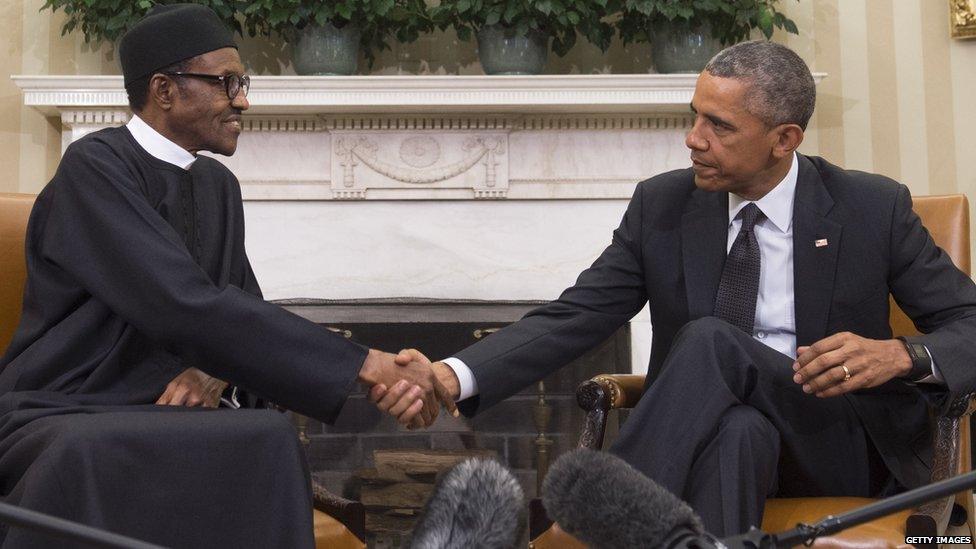Obama pledges support for Nigeria's fight against militants
- Published

President Buhari met President Obama in the White House's Oval Office
US President Barack Obama has pledged to support his Nigerian counterpart Muhammadu Buhari in the fight against Islamist militant group Boko Haram.
In the first meeting between the two since Mr Buhari's election, Mr Obama said the Nigerian leader had a "very clear agenda" for defeating extremism.
The US has committed $5 million (£3.2m; €4.6m) to the fight against Boko Haram since Mr Buhari came to power.
The jihadists have killed thousands in north-east Nigeria since 2009.
Speaking after the two met at the White House, Mr Obama called Nigeria one of the most important countries on the African continent and praised Mr Buhari for tackling corruption, an issue which compromised Washington's relationship with the Nigerian leader's predecessor, Goodluck Jonathan.
Boko Haram has carried out attacks in northern Nigeria since its insurgency began in 2009, most notably the April 2014 kidnapping of 276 Nigerian school girls who are still missing.
President Obama's wife Michelle got involved in an online campaign to draw attention to the girls' plight, #BringBackOurGirls, and the US sent surveillance flights over Nigeria to help locate them.
However, the US refuses to sell weapons to Nigeria because of concerns over its army's human rights record.
Stolen funds
Mr Buhari wrote in an article published in The Washington Post, external just before meeting Mr Obama that "our allies can provide much-needed military training and intelligence as our soldiers take the war effort to Boko Haram".
Mr Obama did not give any indication after his meeting with Mr Buhari that the US would provide military assistance to Nigeria.
Mr Buhari also wrote that he was seeking US assistance in "locating and returning $150 billion in funds stolen in the past decade and held in foreign bank accounts on behalf of former, corrupt officials".
At the outset of the meeting, President Obama praised the March elections won by Mr Buhari as "an affirmation of Nigeria's commitment to democracy".
President Buhari replied by saying Nigeria will "ever be grateful" for the US help in ensuring the elections were free fair and credible.
Mr Buhari, a former military ruler, was invited to Washington shortly after becoming the first opposition candidate to win a national election in March.
Nigeria is Africa's most populous nation, biggest economy and biggest oil producer.

Analysis: Nasidi Adamu Yahaya, BBC Africa, Abuja
Nigeria is seeking US co-operation in combating Boko Haram militants.
The US had previously agreed to help Nigeria fight the insurgency, especially after more than 200 school girls were kidnapped by the militants group from their dormitory in Chibok early last year.
However, relations between the US and the administration of Nigeria's former President, Goodluck Jonathan, soured, amid accusations of human rights violations by the Nigerian military.
President Buhari will also seize the opportunity to seek US assistance to recover billions of dollars from bank accounts in the United States, Switzerland and elsewhere.
The US and other G7 countries had promised to assist Nigeria discover the money - if the country could provide evidence that it had been stolen from the country.
Nigeria will also need US assistance in the fight against corruption, which is one of the issues the country's president had promised to tackle during his campaign days.

Boko Haram at a glance

Founded in 2002, initially focused on opposing Western-style education - Boko Haram means "Western education is forbidden" in the Hausa language
Launched military operations in 2009
Joined Islamic State, now calls itself "West African province"
Thousands killed, mostly in north-eastern Nigeria, abducted hundreds, including at least 200 schoolgirls
Seized large area in north-east, where it declared caliphate
Regional force has retaken most territory this year